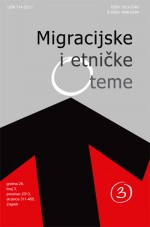Les relations entre immigrants compatriotes issus de pays en conflit : l’exemple des immigrants bosniens, colombiens et congolais établis à Québec
The Relationship between Immigrants Compatriots from Countries in Conflict: the Example of Bosnian, Colombian and Congolese Immigrants Established in
Author(s): Stéphanie Arsenault, Anaïs Nadeau-CossetteSubject(s): Social Sciences
Published by: Institut za migracije i narodnosti
Keywords: refugees; integration; immigration; Colombia; Bosnia and Herzegovina; Democratic Republic of Congo; Quebec; integration strategies
Summary/Abstract: This article presents a new look on the relations established between immigrants coming from a same country in conflict. Based on the grounded theory applied on testimonies of 36 immigrants and refugees established in Quebec City, this study highlights three scenarios distinguishing three ways to understand the contribution of the compatriots in the post-migration integration process. The first observed scenario is the creation, by some respondents, of integration strategies including numerous compatriots. A second scenario is rather characterised by the use of integration strategies involving a restricted contribution of compatriots while a third scenario leads to exclude the compatriots of the post-migration integration strategies. These scenarios are also modulated by time as well as by the accessibility of compatriots and non-compatriots.
Journal: Migracijske i etničke teme
- Issue Year: 2013
- Issue No: 3
- Page Range: 343-366
- Page Count: 24
- Language: French

